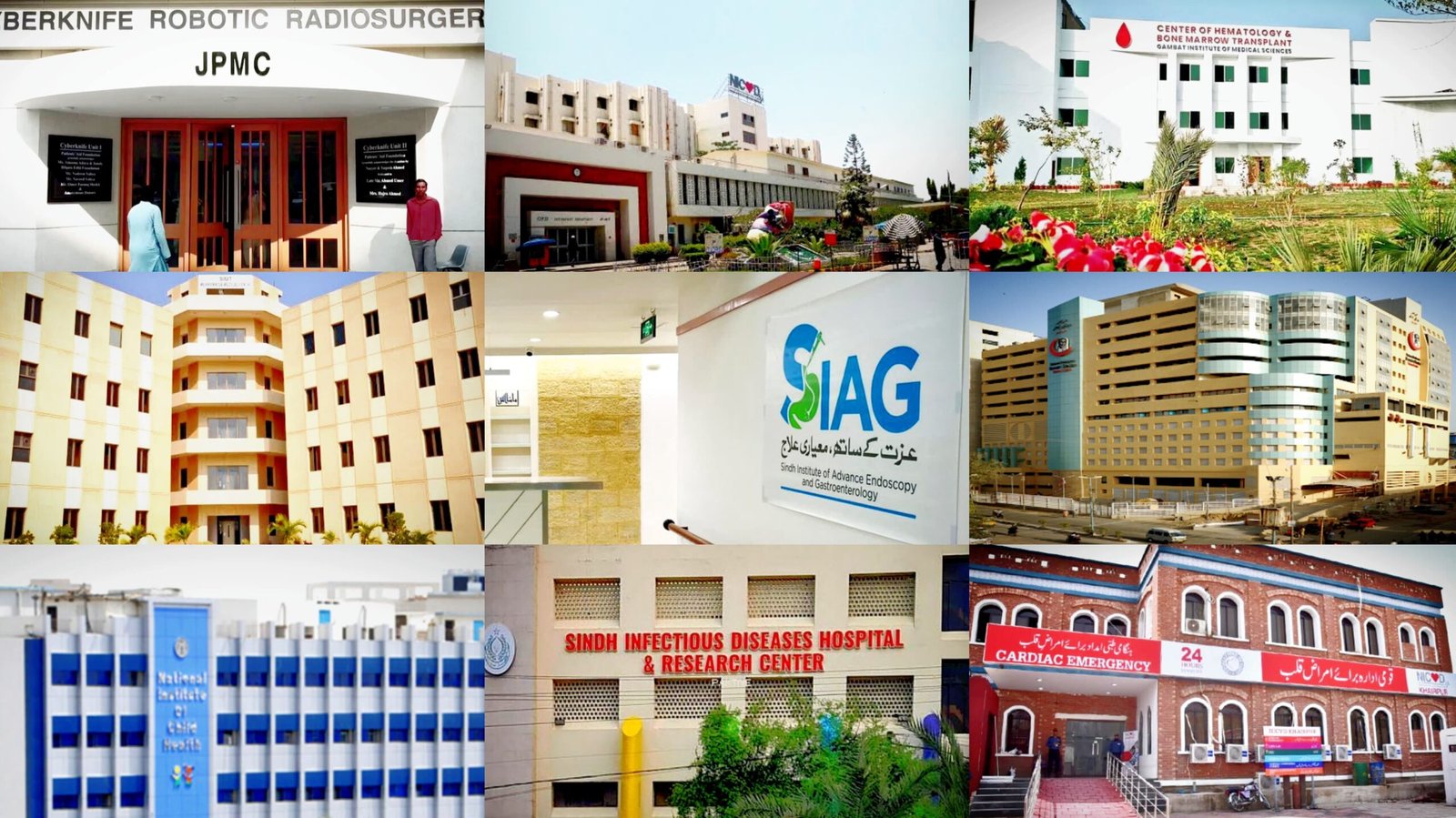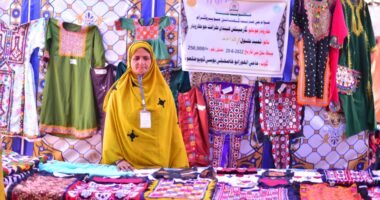
Sindh offers a strong and growing healthcare system that provides free, high-quality medical services to all citizens. From Karachi to Kashmore, a network of hospitals and healthcare centers ensures that people receive top-notch care, including cardiac surgery, trauma treatment, kidney transplants, and advanced cancer care. The province is home to some of Pakistan’s best medical facilities, equipped with the latest technology and offering specialized treatments—all completely free of charge. Below is an overview of some of Sindh’s leading hospitals, highlighting their exceptional services and commitment to public health.
1. National Institute of Cardiovascular Diseases (NICVD)
The National Institute of Cardiovascular Diseases (NICVD), located in Karachi, is one of the leading hospitals in Pakistan for cardiac care. Established in 1963, NICVD specializes in the treatment of heart diseases, including coronary artery disease, heart failure, heart surgeries, and angioplasty.
What sets NICVD apart is its extensive network that includes 10 satellite centers across Sindh, as well as 29 Chest Pain Units (CPUs), which are crucial in delivering timely medical intervention to patients experiencing heart attacks. This network ensures that even people in remote parts of Sindh can access the best cardiac care available. NICVD offers free treatment to all Pakistani citizens, making it a lifeline for those suffering from cardiovascular diseases.
2. Sindh Institute of Urology and Transplantation (SIUT)
The Sindh Institute of Urology and Transplantation (SIUT), located in Karachi, is a premier medical institution in Pakistan for treating kidney diseases and performing kidney transplants. Founded in 1970, SIUT is known for providing free dialysis and renal transplantation services to patients across the country.
SIUT has expanded its services to Sukkur, ensuring that patients from rural Sindh also have access to high-quality urological care. The hospital is not only a leader in kidney transplantation but also offers cutting-edge treatments in nephrology, urology, and research in the field of organ transplantation. SIUT is committed to providing comprehensive care, including dialysis, kidney transplants, surgical interventions, and patient education, all free of charge.
3. National Institute of Child Health (NICH)
The National Institute of Child Health (NICH) in Karachi is one of Pakistan’s largest hospitals dedicated to pediatric care. NICH provides specialized healthcare for children, including neonatology, pediatric cardiology, pediatric surgery, and the treatment of infectious diseases.
NICH also plays an essential role in maternal health, focusing on improving maternal and child health outcomes across Sindh. The hospital has a dedicated Neonatal Intensive Care Unit (NICU), providing critical care to premature or ill newborns. NICH’s services are available free of charge, ensuring that all children, regardless of their socioeconomic background, receive the medical care they need.
4. Gambat Institute of Medical Sciences (GIMS)
The Gambat Institute of Medical Sciences (GIMS) in Khairpur, Sindh, stands as a beacon of hope, providing 100% free-of-cost transplant services for some of the most critical and life-saving medical procedures. GIMS offers free liver, lung, kidney, cornea, cancer, cochlear implants, and bone marrow transplants, making it one of the few institutions in Pakistan where patients can access these highly specialized treatments without any financial burden. These world-class services, typically associated with exorbitant costs abroad, are now available to the underserved population of Sindh, ensuring that every patient, regardless of their economic status, receives the best possible care. By offering these advanced transplant and treatment services for free, GIMS is not only transforming lives but also setting a new standard for healthcare accessibility in the region, providing critical support to those in need of life-saving interventions.
5. Shaheed Mohtarma Benazir Bhutto Institute of Trauma (SMBBIT )
The Shaheed Mohtarma Benazir Bhutto Institute of Trauma (SMBBIT ), located in Karachi, is one of the leading trauma care centers in Pakistan. The hospital provides emergency services for victims of accidents, violence, and natural disasters. BBTC is known for its rapid response and advanced trauma care services, including trauma surgeries, intensive care, and post-trauma rehabilitation.
6. Jinnah Postgraduate Medical Centre (JPMC)
The Jinnah Postgraduate Medical Centre (JPMC), located in Karachi, is one of the oldest and largest hospitals in Pakistan. JPMC is a teaching hospital that provides specialized care in neurology, cardiology, oncology, orthopedics, and pediatrics.
JPMC is also home to Pakistan’s first CyberKnife unit, a revolutionary state-of-the-art cancer treatment technology. The CyberKnife is a non-invasive form of radiation therapy used to treat tumors in the body, including cancers of the brain, spine, lungs, and prostate. Traditionally, patients seeking CyberKnife treatment had to travel abroad, often spending between $50,000 and $90,000 for the procedure. However, JPMC has made this life-saving treatment available for free in Sindh, allowing thousands of patients to access advanced cancer care without incurring exorbitant costs. This is a monumental development for Pakistan, as it places the latest cancer treatment at the disposal of those who need it the most, without financial barriers.
7. Dow University of Health Sciences (DUHS)
Dow University of Health Sciences (DUHS), located in Karachi, operates several healthcare institutions, including Dow University Hospital. DUHS provides comprehensive medical services, including orthopedic care, cardiac care, surgical interventions, and neurology services. DUHS is also a leading medical educational institution, training the next generation of doctors and healthcare professionals.
8. C-ARTS AUTISM CENTER
The Sindh government has established a network of C-ARTs (Centers for Autism Rehabilitation and Training) to support individuals with autism spectrum disorder. There are three centers in Karachi and one in Hyderabad, offering services like diagnostic assessments, therapy, speech development, and social skills training. These centers aim to provide comprehensive support for individuals with autism, while also training parents and professionals to better assist in their care and development. They play a crucial role in improving the quality of life for those with autism in Sindh.
9. Other Healthcare Institutions in Sindh
In addition to the above-mentioned hospitals, Sindh is home to several other healthcare facilities that play a crucial role in providing primary and specialized care to both urban and rural populations. These include:
- Civil Hospital in different Districts of Sindh: One of Pakistan’s largest public hospitals, offering emergency care, surgical treatments, pediatric care, and obstetrics services.
- Lyari General Hospital: Serving the underserved population of Karachi’s Lyari area, this hospital provides essential services like maternal care, pediatric care, and general healthcare.
- Rural Health Centers (RHCs) and Basic Health Units (BHUs): These centers are the first point of contact for healthcare in rural Sindh, providing general consultations, vaccinations, and emergency services.
Conclusion
The Sindh health system is a beacon of hope and innovation, providing accessible, free, and high-quality healthcare to millions of people. With institutions like NICVD, SIUT, NICH, GIMS, Benazir Bhutto Trauma Center, JPMC, and DUHS, Sindh has built a comprehensive network that serves the health needs of Pakistanis from Karachi to Kashmore.
Particularly notable are the developments in cancer treatment at JPMC, where the introduction of CyberKnife technology means that life-saving cancer treatment, once only available abroad at prohibitive costs, is now accessible to all Pakistani citizens—free of charge.
This commitment to universal healthcare and advanced medical treatment makes Sindh a leader in public healthcare in Pakistan and a model for the rest of the country.












